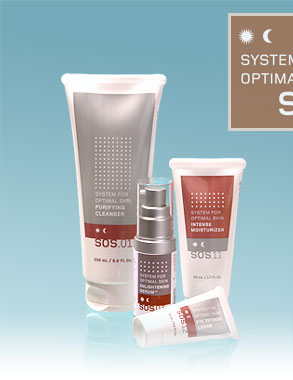Vitamin-C – the Road MAP to younger looking skin
It seems that just about every beauty magazine has at least one
article about Vitamin-C. After all, virtually every skin care line
touts its Vitamin-C content and countless studies and articles
have been written about the beneficial effects that Vitamin-C can
have on the skin. What is not as widely known, however, is that
not all Vitamin-C's are created equal. It is not enough just to
have Vitamin-C in a product to produce the desired effects. In
order for Vitamin-C to work effectively in skin care formulations
it must have specific properties: it must both penetrate the cell
and coat the outside of the cell wall in order to prevent cellular
degradation, which occurs at both levels, and must be absorbed
very quickly by the skin and remain in the skin for a prolonged
period of time, thus allowing it to have its desired effect.
Long known to be a powerful antioxidant, Vitamin-C is a vital
building block for collagen formation in the skin and, in proper
formulations can also serve to increase the skin's elasticity;
inhibit hyperpigmentation; diminish skin discoloration, and increase
the skin's luminosity. Unfortunately, most skin care products use
L-Ascorbic Acid as their primary form of Vitamin-C. While L-Ascorbic
Acid does, for approximately a week, possess a high degree of bioavailability,
it rapidly loses both its stability and its potency, quickly rendering
it ineffective. In efforts to combat this rapid loss of effectiveness,
L-Ascorbic Acid has been formulated with many different stabilizers
and binders that, unfortunately, have been shown to further hamper
its effectiveness by not allowing it to penetrate down to the lower
layers of the skin. According to Nicholas Perricone M.D. in his
book "The Wrinkle Cure":
The solubility of a vitamin – that is, whether it dissolves
in water or in fat – determines which part of a cell that
Vitamin can enter. With antioxidant vitamins, solubility also
determines which part of a cell the Vitamin can protect from
free radicals.
The natural form of Vitamin-C, L-Ascorbic Acid, is water-soluble.
That means that it can gain admission only to the inside of a
cell, which is mostly water. So although L-Ascorbic Acid concentrates
in the interior of the cell, it cannot prevent free-radical damage
on the outside of a cell. What's more, L-ascorbic acid is very
acidic, which makes it quite irritating to the skin. It also
breaks down rapidly, losing its potency within 24 hours.
Furthermore, over an extended period of time, L-Ascorbic Acid
can cause the very aging that it is being used to treat. If not
properly stabilized it can oxidize and cause inflammation, leading
to the release of protease enzymes, which are one of the main causes
of dermal aging. Moreover, if L-Ascorbic Acid is at a pH of approximately
3.0 or lower (it requires a pH of ~3.0 or lower for effective penetration);
is formulated in a high concentration (above 10%); or is otherwise
irritating to the skin; it can also produce protease enzymes, once
again leading to premature aging of the skin. Also, due to its
exfoliant activity, L-Ascorbic Acid is unsuitable for people with
sensitive skin.
Therein lies the basic problem faced by skin care formulae that
use Vitamin-C: While L-Ascorbic acid is generally accepted as the
only form of Vitamin-C that possesses suitable bioavailability,
its instability combined with its inability to simultaneously both
coat and penetrate the cell wall render it virtually ineffective
in most topical skin care preparations for more than a few days
after they are opened. The challenge then, is to come up with a
form of Vitamin-C that possesses a high degree of bioavailability
combined with properties that allow it to both stay resident on
the cell's surface, while simultaneously penetrating the cell wall.
Moreover, the formulation must be inherently stable and have a
long-shelf life. Luckily, there is one form of Vitamin-C that does
all of the above – Magnesium Ascorbyl Phosphate, or MAP as it is
often called.
According to the American
Academy of Dermatology, Magnesium
Ascorbyl Phosphate is deeply absorbed into the skin and stays in
the skin's cellular layers for up to 48 hours, provided that it
is properly formulated with specific liposomes and oligomers. This
sustained continuous-action complex bathes both the exterior wall
and the interior of the cell with active Vitamin-C. In fact, studies
have shown that, when properly formulated with specific oligomers,
Magnesium Ascorbyl Phosphate is the only form of Vitamin-C that
simultaneously penetrates the cell wall and coats the exterior
of the cell, while remaining both stable and bioavailable for a
prolonged period of time. With effective penetration occurring
at a relatively neutral pH of approximately 5, Magnesium Ascorbyl
Phosphate is gentle on the skin and does not cause any inflammation
or associated skin aging.
Although rarely used in high concentrations (it is most effective
when used in concentrations of up to 10%, depending on the skin's
sensitivity) due to its prohibitive cost (it costs over 100 times
more than L-Ascorbic Acid) Magnesium Ascorbyl Phosphate has, because
to the qualities mentioned above, been shown to be the best form
of Vitamin-C for skin care products. Furthermore, in their study:
"Inhibitory Effects of Magnesium Ascorbyl Phosphate on Melanogenesis"
published in 1993, Tagawa Masato et al confirmed the findings of
the American Academy
of Dermatology with respect to the stability
and longevity of MAP in skin care preparations, while showing that
MAP also had a skin lightening effect on more than three quarters
of the patients tested.
Magnesium Ascorbyl Phosphate is, in fact, the only truly stable
form of Vitamin-C that has been shown to have the all of the qualities
required in genuinely effective skin care preparations. In spite
of all the research that shows that Magnesium Ascorbyl Phosphate
is far superior to L-Ascorbic Acid in topical skin care products,
the price differential alone dictates that L-Ascorbic Acid remains
the most common form of Vitamin-C used in the skin care industry
today.
|

